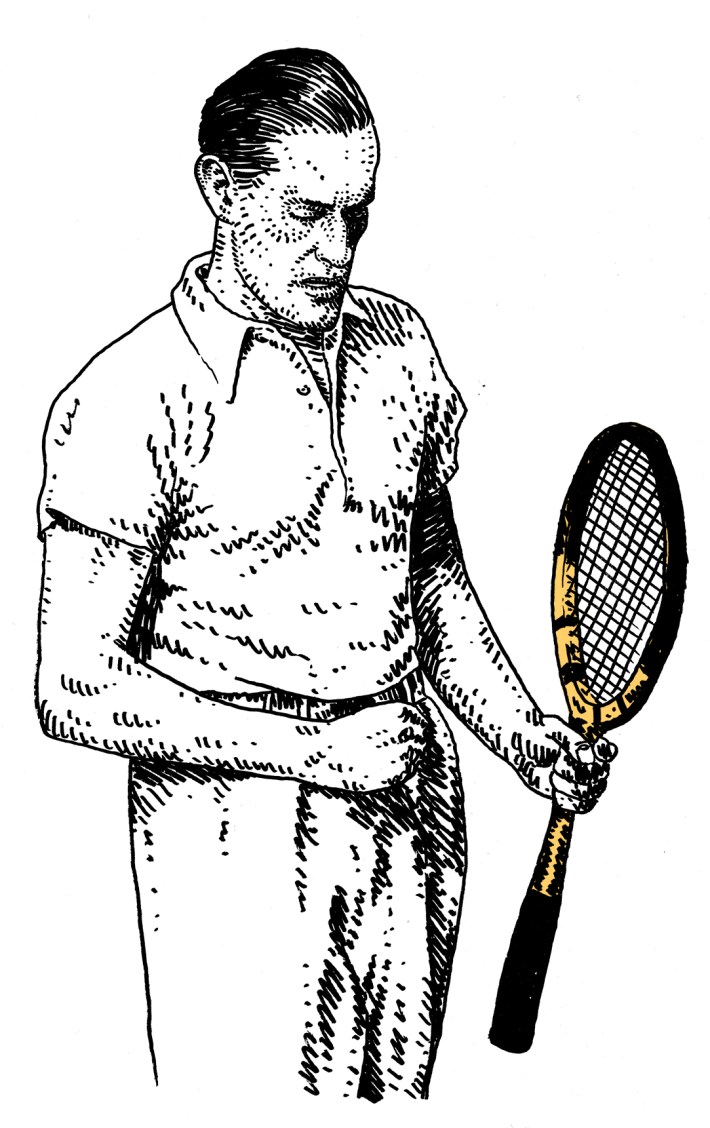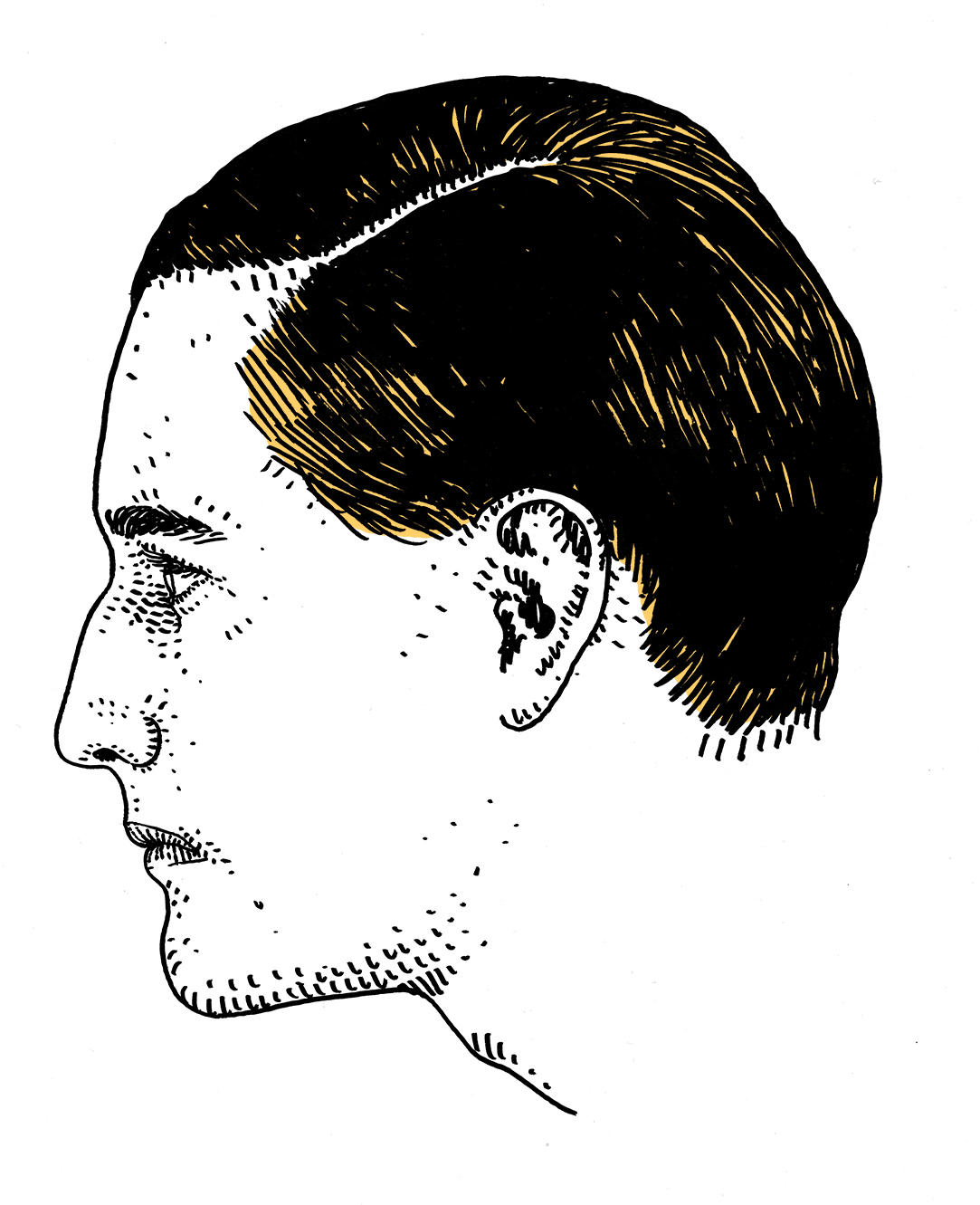This is our monthly cross-post from the Sports Stories newsletter. It’s written by Eric Nusbaum and illustrated by Adam Villacin, and focuses on overlooked or forgotten stories from sports history. We like it very much, and if you’d like to become a subscriber you can do so by signing up here.
Gottfried von Cramm was a tall and elegant man with blond hair, a high forehead, and a very straight nose. He was the son of a Baron, which meant that he too was a Baron, and on the tennis court, he floated with an air of nobility about him. Even as he suffered crushing defeats both professional and personal, he remained composed. In this regard, he was perfectly German.
But he was not quite perfectly German. At least not by the standards of the Nazi Party, which came to its power just as von Cramm was coming into his own. Von Cramm’s life embodied the sweep of history and also the intimate, particular pains of people whose lives are pushed and pulled by events much greater than themselves. His legacy lies somewhere in that gray area between hero, accomplice, and victim.
Von Cramm was born in 1909 and raised in an actual castle. By the early 1930s, he had established himself as the finest men’s tennis player in Germany and among the best in the world. He spent the early 1930s competing on the German Davis Cup team and in tournaments around Europe, winning his first major singles title, the French Open, in 1934.
This victory propelled the Baron to great celebrity in Germany. Even as that country grew increasingly militaristic under Hitler, von Cramm continued to exist on a seemingly separate plane. Tennis fans knew him as gentlemanly and refined. He once famously cost Germany a shot at a Davis Cup title by admitting fault on a match point against the United States. It was a remarkable display of sportsmanship.
"When I chose tennis as a young man," the baron said, "I chose it because it was a gentleman's game, and that's the way I've played it ever since I picked up my first racket. Do you think that I would sleep tonight knowing that the ball had touched my racket without my saying so? Never, because I would be violating every principle I think this game stands for. On the contrary, I don't think I'm letting the German people down. As a matter of fact, I think I'm doing them credit."
Von Cramm’s fame and stature also insulated him from the consequences of his politics. He was not a radical, but an aristocrat, who looked at Hitler’s government as untoward, unbecoming, and unlikely to last very long.
It’s worth noting here that Von Cramm played under the swastika flag. He saluted it as other German athletes did. He was aware of the fact that his success as a prototypical Aryan tennis star and the success of the national team he led were deeply important to Hitler. None of this prevented him from competing. But von Cramm was also disdainful and at times openly critical of the Nazi regime. He believed, it seemed, in a different version of Germany than the one he was living in.

Von Cramm refused to join the Nazi Party despite repeated entreaties. He publicly protested the expulsion from the German Davis Cup team of his friend and former doubles partner, Daniel Prenn, who was Jewish. Speaking to a reporter, he once offhandedly referred to Hitler as a mere “housepainter.”
Von Cramm could do all this because he was one of the country’s greatest athletes. He won another French Open in 1936, and reached four consecutive Wimbledon finals between 1934 and 1937. He lost all four times—the first three to the Englishman Fred Perry, and the final time to an up-and-coming American player named Don Budge. Von Cramm and Budge would also play an epic Davis Cup match in 1937 that was the subject of a lovely book called A Terrible Splendor by Marshall John Fisher.
The Davis Cup match with Budge would also be Von Cramm’s last big moment on the international tennis scene. In early 1938, von Cramm was arrested by the Gestapo on charges of homosexuality. Throughout the 1930s, he had been in a relationship with a Jewish actor named Manasse Herbst. Von Cramm’s sexuality was an open secret in the tennis world and hardly a secret at all in his circles in Berlin.
But as the Nazi regime grew increasingly homophobic, and von Cramm grew increasingly vocal in his criticism, the relationship with Herbst became an excuse to silence him. By then, Herbst had already fled from Germany with von Cramm’s help. But von Cramm himself was stuck. American sports stars, including von Cramm’s rival Don Budge and Yankees outfielder Joe DiMaggio, signed a letter of protest demanding von Cramm’s release from custody. But after a secret trial, the tennis star was sentenced to a year in prison. He would be let out on probation after about six months.
Von Cramm made a short return to tennis, playing in minor events. But he was barred from representing Germany in international play, and as a convicted felon, banned from Wimbledon in 1939. (This was a cowardly decision at the time, and has recently come under scrutiny.)
In 1940, von Cramm was conscripted into the German military. He became an officer and suffered from bad frostbite in Russia before being sent home from the front in 1942, and then suddenly dishonorably discharged.
One of his nephews would later tell Sports Illustrated that von Cramm was discharged for conspiring against Hitler.
My uncle was one of 500 aristocrats dishonorably discharged by Hitler in 1942. It was common knowledge he was against the Nazi regime. It was known that he had been in touch with underground leaders. And it was suspected that he was at least on the periphery of the group plotting against Hitler's life. He knew about some of those assassination attempts before they took place. I think the only thing that saved his life was his friendship with the king of Sweden. Hitler wanted to do business with Sweden, and my uncle knew all the important people there.
Von Cramm did indeed develop a friendship with the King Gustav V of Sweden. The king recruited von Cramm to coach the national team, and the former tennis star used this position to act as a courier for various underground groups. There is no evidence that he was directly involved, but when a resistance plot to assassinate Hitler failed on July 20, 1944, von Cramm wrote to one of his friends concerned about the torture that the conspirators were facing:
I don’t want to know what is happening to them. I only want to know who has survived and will be out free again, who is still free and when they want to try again the next time. They can then depend on me!
After the war von Cramm returned briefly to competitive tennis. He won a pair of German national titles and competed in the Davis Cup until 1953. Upon his retirement, he started a business importing Egyptian cotton into Germany, and married Barbara Hutton, a Woolworth’s heiress who had previously been married to Cary Grant, among many others.
The marriage did not last long, but von Cramm became a successful businessman and once again a fixture in international tennis circles. This time, he was the elder statesman. Dick Savitt, the first Jewish player to win at Wimbledon, later told Sports Illustrated about how von Cramm had gone out of his way to support him early in his career.
“In fact, he sent me a telegram when I won Wimbledon. The baron didn't care what a person's background was. He just cared how people acted.”
Von Cramm, who split his time between Berlin and Cairo, died in a car accident in Egypt in 1976. He was 67 years old. The following year, he was finally inducted into the Tennis Hall of Fame.
“Von Cramm was anti‐Nazi,” said Budge after Cramm’s death. “Yet, he was a German sports hero. He was also one of the unluckiest men I knew.”
Related Reading:
I barely scratched the surface here. If you want more, you should start with Fisher’s book, A Terrible Splendor, which has a lot of formal similarities with John McPhee’s beautiful Levels of the Game, and also serves as essentially a biography of von Cramm.
I also recommend this long essay from Tennis Life Magazine by Dr. Reinhard Andress, and this deeply reported retrospective from Sports Illustrated in 1993 written by Ron Fimrite. To his credit, Fimrite tracked down a lot of major tennis figures who actually knew and played with von Cramm. Both of these pieces reckon with the challenge of commemorating a player whose greatest achievements came under the Nazi flag, but who was also mistreated by his own government. Unfortunately, it seems that for a long time, the solution by the tennis establishment was to pretend that von Cramm did not exist.






